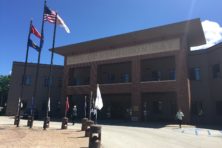Kewaunee Won’t Impose CAFO Moratorium
- Share
- Tweet
- Pin
- Share
The Land and Water Conservation Committee of Kewaunee County dropped consideration of a moratorium on the expansion of Concentrated Animal Feeding Operations (CAFO). Corporation Counsel Jeffrey Wisnicky advised against the moratorium, which he said would be vulnerable to legal challenge.
“I just think that you’re asking for trouble on that one,” Wisnicky said. “I don’t think that would be defensible.”
There are some ways localities can implement regulations that are stricter than state standards in order to protect public health, but Wisnicky believes a countywide prohibition on additional cows is too broad.
Although there is data provided for parts of the county that document animal agriculture’s contribution to contaminated water, the argument could fall apart in other parts of the county where soil is deeper or there is no direct evidence of manure affecting water quality.
Wisnicky said the ordinance also would not prohibit farmers from nearby counties expanding their herds and trucking their manure into Kewaunee. He favors continuing to implement restrictions on where and how manure is spread, including the new NR 151 administrative rules that will limit manure spreading in the karst topography of the peninsula. Committee members agreed, but cited optimism about cooperation with the farming community as their reason why.
“I feel the only way we’re going to get forward is by working together,” committee chair Chuck Wagner said. “And I have seen things improve.”
“I’m not convinced that trying to limit herd growth or trying to count cattle is the answer for us,” said committee member Lee Luft. “The moratorium would create an even bigger divide in the ‘us versus them’ and I think we are down the path to working together. There is a cooperative spirit here and I would really hate to see that dismantled.”
But Luft and Land Conservation Department Head Davina Bonness said the moratorium would still be on the table if the new NR 151 rules from the Department of Natural Resources (DNR) are watered down or prove ineffective.
“NR 151 is going to take away spreadable acres from farms,” Bonness said. “If it doesn’t work or NR 151 doesn’t get passed, then revisit the discussion of a moratorium.”
Luft pleaded with the farming community to consider the possibility of a moratorium and call the Natural Resources Board (NRB) and state legislators to support the changes to NR 151.
“We can have as many people as we want write and appear before the Natural Resources Board,” Luft said. “But if they don’t hear from the farming community – a positive response from the farming community – I expect that these rules will be watered down.”
The NRB will hear the proposed rules at its Jan. 24 meeting. If the NRB approves them, the state legislature will still need to approve them before they go into effect. Changes to the proposed rules can be made throughout that process.
You can read the draft rules here: dnr.wi.gov/news/input/documents/rules/WT1516DraftRule.pdf.

